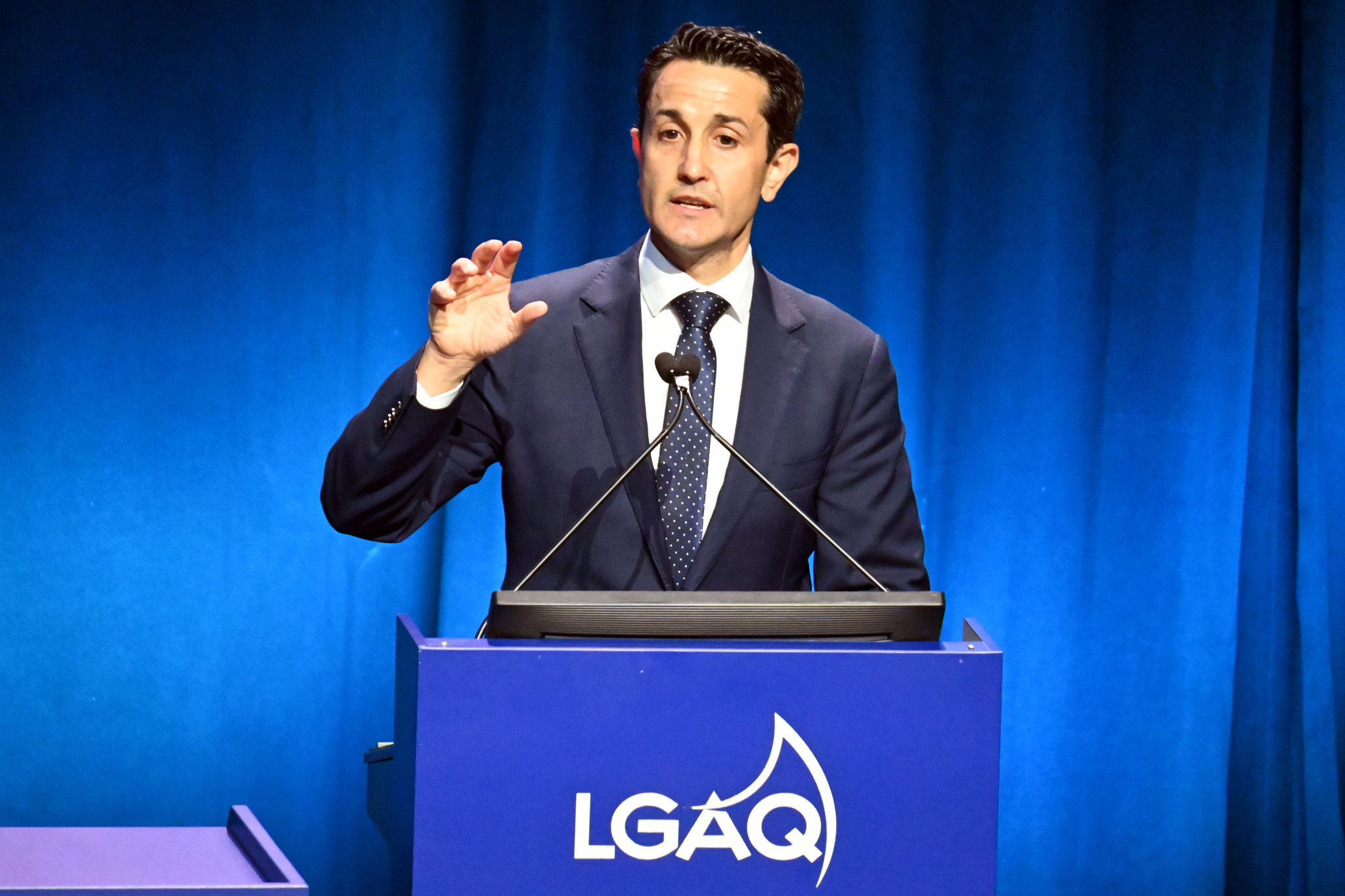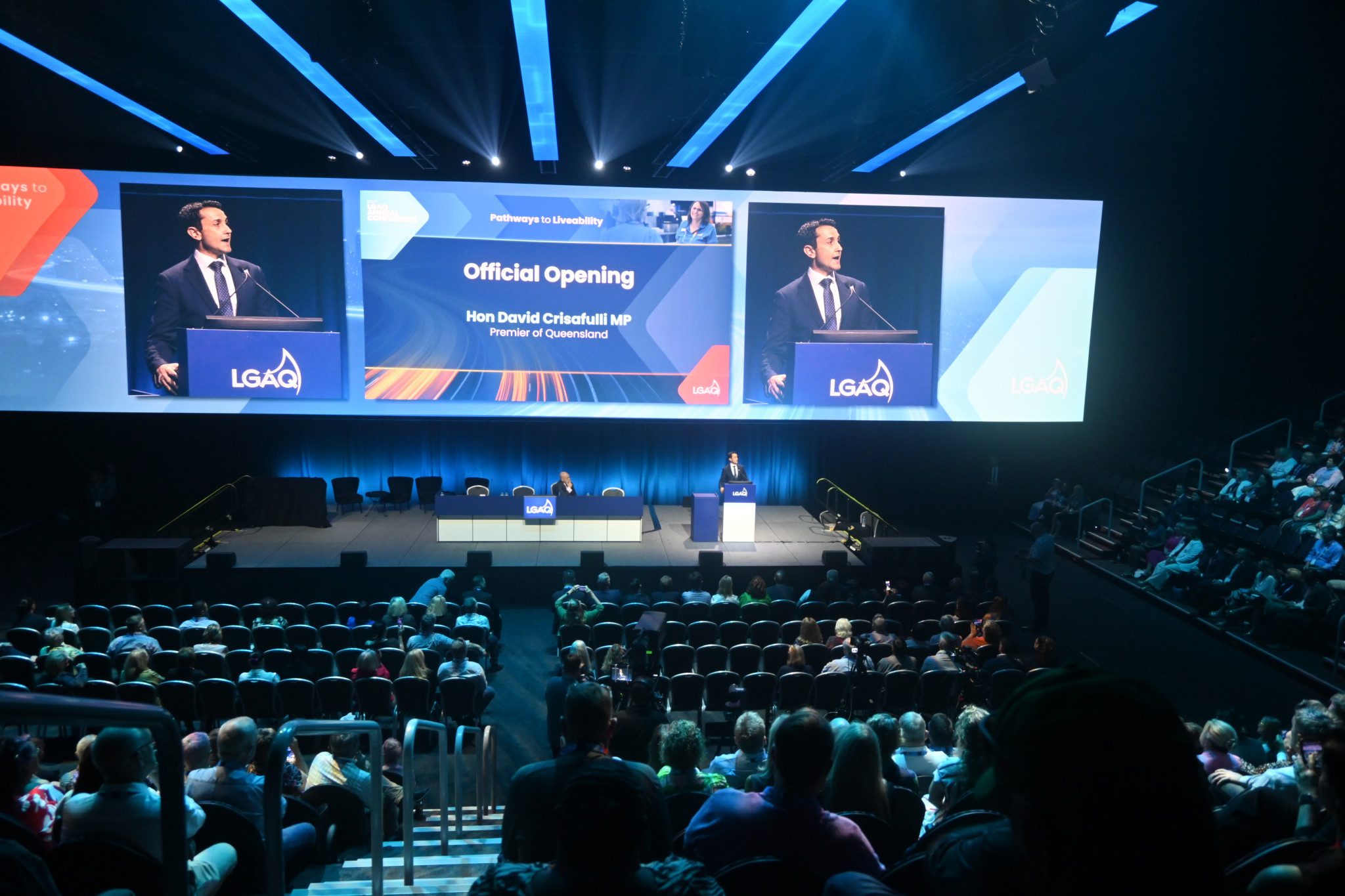General News
22 October, 2025
Crisafulli hands more power to elected mayors and councillors
The Premier had tongues wagging at the LGAQ conference on the Gold Coast.

Premier David Crisafulli has unveiled sweeping local government reforms, promising to “put power back in the hands of mayors and councillors” while reaffirming his commitment to a new partnership with Queensland’s 17 First Nations councils.
Speaking before hundreds of delegates at the Local Government Association of Queensland (LGAQ) annual conference on the Gold Coast, the Premier declared that “Brisbane doesn’t know best”, vowing to restore autonomy to local leaders and strip back bureaucracy.
“You should be held accountable by the people who put you there, not by (Local Government Minister) Ann (Leahy) and not by me,” he said.
“When I talk about equal partners in government, I mean it.”
Mr Crisafulli said the reforms would remove “layers of red tape” and ensure mayors remained the voice of their councils, not faceless officials.
Under the proposed changes, mayors will officially be the spokespeople for local governments, while councillors will regain the right to speak publicly on issues without bureaucratic interference.
“You will do so without the hand of bureaucracy stopping you from commenting on the things that matter to your community,” he told the crowd to applause.
The Premier also announced the repeal of the current conflict-of-interest framework, which has long been criticised by councils for being overly complex and punitive.
In its place, the government will reinstate the simpler “material personal interest” model, tightening penalties only for those who deliberately misuse their position.
“Those who don’t do the right thing will have to face the full force of the law,” he said.
“But the many hundreds of people who turn up and have a crack for their councils and communities will no longer be tied up by bureaucracy.”
Another significant change will be to the Office of the Independent Assessor (OIA), which has been a point of frustration for many councils since its inception.
Mr Crisafulli confirmed the OIA would lose jurisdiction over low-level conduct complaints, focusing only on serious misconduct or corruption.
“For those who do the wrong thing, there are bodies to hold you accountable,” he said.
“But for those subject to vexatious and nonsensical claims, you cannot be held down and prevented from serving your community. You will be held accountable by your community every four years.
“And if you’re not breaking the law, you should be free to do your job.”

The reforms were met with cautious optimism by many mayors, who have long pushed for changes to what they see as an overly restrictive system.
LGAQ president Matt Burnett praised the Premier for listening to councils, but many mayors and councillors told North West Weekly that they were waiting for more information.
Cr Burnett said councils wanted a fairer funding model and less cost-shifting from higher levels of government.
“We need the federal government to come with us. We need them to shift gears, change direction, and bring local government into the future,” he said.
LGAQ CEO Alison Smith described the Premier’s announcements as a “step towards restoring balance and respect between governments”.
Opening the conference, she said councils were being “asked to do so much more with less” and deserved both autonomy and financial certainty.
“It is simply unacceptable that councils are receiving less untied federal funding each year and still being asked to do so much more with it,” she said.
“We need the federal government to change direction and bring local government into the future.”
Deputy Opposition Leader Cameron Dick was more guarded.
He said the Crisafulli government’s plans lacked substance and detail.
“The devil is always in the detail when it comes to the LNP,” he said.
“It was another very broad-brush speech by the Premier, and mayors and councillors across Queensland need to see that detail sooner rather than later.”
The Premier’s appearance on the Gold Coast came just a day after unveiling the First Nations Council Accord, a landmark agreement co-signed with 17 Indigenous councils aimed at supporting self-determination, home ownership, and improved local services.
“It’s your call, not ours,” he told Indigenous mayors in attendance.
“Where you want it to occur, our appetite is for you to own your own home in the place that you grow up, and that’s important to us.”
The government says the accord will strengthen collaboration with Aboriginal and Torres Strait Islander councils and deliver housing and infrastructure outcomes designed by communities themselves.
The announcement has been widely welcomed by Indigenous leaders, but not without controversy.
Katter’s Australian Party leader Robbie Katter accused the government of introducing “a voice to Parliament by stealth”.
He argued that Queenslanders had already rejected such a proposal in last year’s referendum.
“We don’t need yet more bureaucrats and departments to give some councils more voice than others,” Mr Katter said.
“Cabinet should be responsive to all Queenslanders, and it’s incredible to see the LNP government going against the clear wishes of 68 per cent of Queenslanders.”
Despite the criticism, Mr Crisafulli said the accord reflected his government’s commitment to “equal partnership” with all councils – mainstream and Indigenous alike.
“During the course of this term, there will be Indigenous Australians living in their own home in one of those 17 discrete communities,” he said.
“That gets me out of bed in the morning.”
Cr Burnett said the Premier’s reforms were a reminder of why local government mattered. “We’re the ones who face our communities every day, who deal with the potholes, the parks, the rubbish, and the real problems,” he said.
“If this government truly wants to work with us as partners, we’ll get on with the job of building stronger, fairer, more liveable communities.”
Ms Smith agreed, saying the next few years could be transformative if the partnership holds.
“This is an unusual time – we’ve got no elections until 2028, so we can chart new pathways and really get things done,” she said.
“Our focus now is on creating pathways to liveability – not just for today, but for the next generation of Queenslanders.”